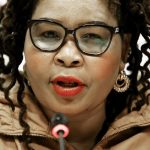BEREFT OF AUTONOMY OP-ED
Young people must champion a new politics if they are determined to make democracy work

For many South Africans, democracy simply means voting — reducing participation to an act that occurs every five years. But if we are serious about building and strengthening democracy, then we have to ensure citizens are empowered to support the growth and development of their own communities, skilled enough to transform their lives and encouraged to hold public representatives to account.
In recent months, people from across the country have been forced to grapple with the deeply fractured social structures that exist in every community, from the economy, education and health to safety and support networks.
These fractured structures have pushed us to reflect and think about the democratic project that started forming in 1994, and whether such a project has achieved its desired objectives. The democratic gains made since the end of the apartheid system have often been overlooked in comparison to its failures. People from all walks of life and particularly those born into democracy, are increasingly becoming disillusioned at the state of democracy. This disillusionment is validated by the failure of those elected into positions of power and their lack of accountability.
Young Matshidiso, for example, lives in a township about 30 kilometres away from the city centre in Johannesburg. Her refusal to vote in the most recent local government elections despite going out to participate and engage as an election observer is indicative of a young person who wants to participate and contribute to the democratic project, but remains disillusioned that it will not bear any benefit for her and the community members where she resides. Matshidiso, like many ‘born frees’, would’ve been a first-time voter had she cast her ballot. Her choice not to vote is a loud but unheard political act that emphasises the feeling she harbours of the democratic system in the current context. She was part of a massive project led by the Ahmed Kathrada Foundation and Accountability Lab taking civic education to a number of different communities, engaging youth on the need for civic participation as a means to enhance and strengthen citizen-led action.
Matshidiso is one of many young people who grow impatient at the slow pace of change while staring down the harsh barrel of poverty, inequality and joblessness. Yet, amidst the hopelessness, she still finds the strength to serve her community and care for the people around her through an organised youth activist club — a club that has campaigned to open a local library that has remained closed to the community since it was built in 2018. This form of localised organisation and increased youth engagement in government processes is the kind of vehicle needed to take us through these difficult periods in our young democracy. It is how we centre a new political paradigm of political engagement beyond the normal party political membership systems.
At the core of the problem is distrust — solidified by years of empty election promises, rampant corruption and state institutions that continue to fail in delivering basic services. Regardless of the good stories and small acts of change witnessed on the occasional campaign trail, politicians have lost their way. Seduced into acting in their party or self-interest, rather than the collective good of the country and all who live it. Unable to ‘honour those who suffered for justice and freedom in our land’. This calls for new politics that allows young people to find voice and strength outside of the traditional political party affiliation. Politics that centres love, care, hope and action in the pursuit of the greater good.
For many people, democracy simply means voting — reducing participation to an act that occurs every five years. This cannot be sustained. People have agency and power to act, and thus are the most important proponents of the systemic change we deeply desire.
If we are serious about building and strengthening democracy, then we have to ensure citizens are empowered to support the growth and development of their own communities, skilled enough to transform their lives and encouraged to hold public representatives to account. This entails broad-based civic education, redesigned and effective accountability mechanisms and a people-centred governance model. There is also an urgent need for a collective dialogue on what we mean and understand by accountability beyond the rhetorical ‘removal’ of those that are corrupt.
I can relay testimonies from hundreds of young people feeling disillusioned about this democratic project that carried with it so many of our parents’ dreams for a better life. These would be testimonies of people living their nightmares and waking up to hopelessness. Testimonies that are already public knowledge in every newspaper and visible on most street corners. They are testimonies that have left us feeling powerless. Yet they should be guiding us and prompting us into action. If anything, these stories and testimonies of pain, anguish and suffering should unify us to champion systemic reform based on the values and ideals enshrined in the constitution. Young people the world over have already responded to much of these cries by organising and using tools like social media to act, mobilise and build consciousness around issues of social injustice. That is how we build power and stand against those who do not act in the interest of the people.
Young people have shown us that when given the tools and the necessary support, they will stand up for human rights and for what is just. Members of the AKF Finetown Youth Club displayed immense courage by stopping xenophobic attacks on a business in their area. They form part of a generation that is guided not by their divine loyalty to a political party, but to the protection and enhancement of human rights and freedom, as affiliates of shared humanity. This is the alternative political paradigm we must endeavour to create; one that is led and driven by young people in each of their communities with a common progressive agenda.
There are those fighting for the eradication of pit toilets, climate change, jobs, safer communities, quality education, the right to housing and sanitation, all of whom have varying degrees of victory in attempting to hold those in public office to account for their inability to do their job. Oftentimes threatened by violence and hatred, these activists and campaigners showcase that the problem is not the Constitution but those who have the power to act on it and the system that has been designed to uphold it. Matshidiso and her team were able to apply pressure on officials to demand the local library in their community be opened. They were threatened and told to ‘know their place’. They were turned away from offices meant to serve them. They continued to engage various stakeholders and public representatives to ensure that timelines and commitments were made. They provided hope through their actions.
This kind of participation is how we strengthen and support the democratic project. It allows us as non-aligned individuals to work on healing our democratic system into a healthy and functioning one that gives space for young people to be active contributors.
In the heart of the Covid-19 pandemic, we witnessed huge amounts of money mismanaged and ‘disappear’. In our collective heartbreak, we tweeted and rambled over dinner tables, cried over our painful losses and found comfort in one another. Just as these painful moments remind us of the years of dire neglect and devastation from Covid-19, conflict, climate change, political instability and more, they also provide us with the unique opportunity to create extraordinary change. History has shown us that when young people stand together, much can be achieved. From the youth of 1976, the 1980s and the more recent #FeesMustFall movement, young people continue to show that the answer to making the system listen is by working together. We have to use this moment of strife to forge a new politics and build a democratic system that serves the needs of all the people. DM/MC
Irfaan Mangera is the Youth Activism Programme Manager at the Ahmed Kathrada Foundation.




















 Become an Insider
Become an Insider
Comments - Please login in order to comment.